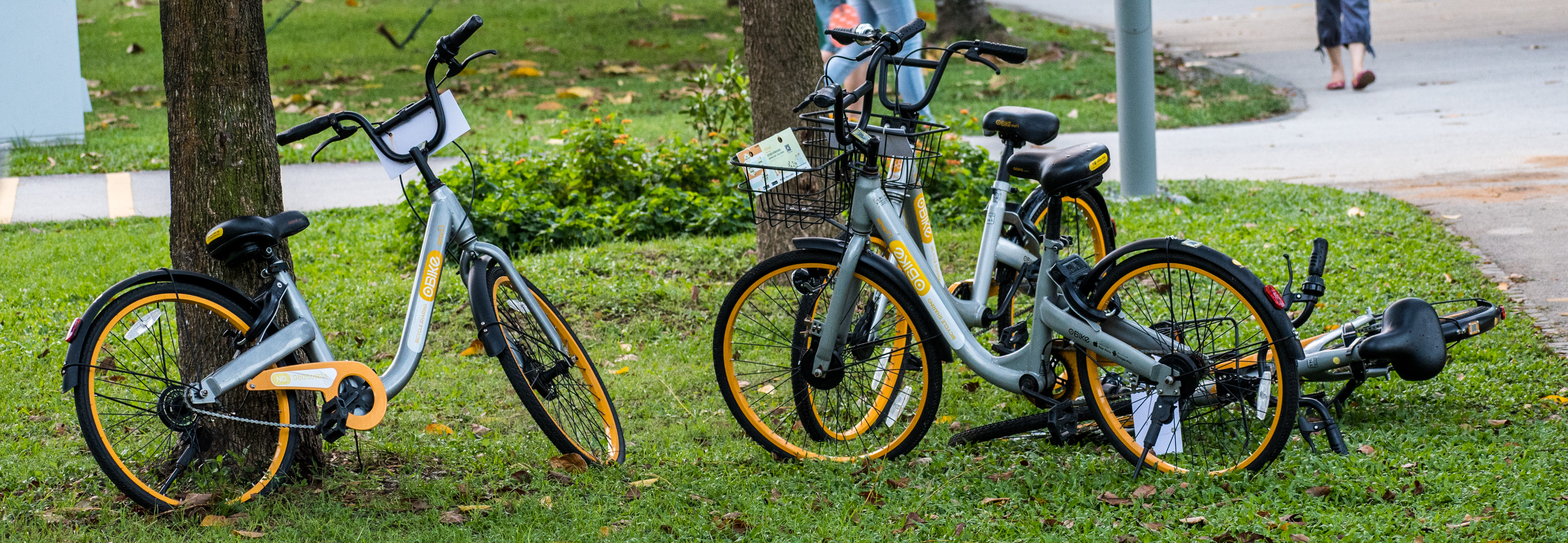From the moment cycling on footpaths became legal in Singapore (finally), bike sharing operators wasted no time in flooding the island with bicycles. Today, barely a year in, there are at least five bike sharing operators (Ofo, oBike, Mobike, SGBikes, GBikes and potentially Baicycle, just in case you lost count) in Singapore, owning a fleet of about 100,000 bicycles. And with exponential growth comes the inevitable pain points.
Convenience vs Regulation
Bike sharing as it is is a battle between convenience and regulation. Surely, the core selling point of a bike sharing service is convenience. Riders want the ability to grab a bike just about anywhere and then park it anywhere you want at your desired stop. That's the main advantage of dockless systems in the first place, and in an ideal world, that's how bike sharing should be. But because people love taking the easy way out and start placing these bikes in unimaginable places, the Government has responded with a rather heavy-handed and clearly reactionary approach (which seems to be a characteristic of this Government these days–see how they responded to the Little India riots)–geo-fencing.
From the second half of this year, you can only park your shared bicycle at designated parking areas, most of which are located near or at bus stops. Want to ride to a place where buses aren't readily available? Too bad.
The method of implementation–QR codes–is also suspect. QR codes, while useful, are not the answer to everything. I can already anticipate two problems. One, as many scheming Singaporeans have pointed out, a fake QR code could easily be printed out to fool the app. Second, surely some trolls will take the extra effort to peel off these QR codes from designated places, leaving legitimate users high and dry.
The geo-fencing solution, too, is arbitrary and nullifies the key advantage of bike sharing–that is, reducing the distance you have to walk. In my opinion, as long as bikes don't obstruct walkways and such, they are not indiscriminately parked. This Straits Times article shows several pictures of 'indiscriminately parked' bicycles, when it is obvious that the users of these bicycles have made at least some effort to steer clear of the sidewalks. Draw a box in the middle and suddenly these bicycles are no longer indiscriminately parked. The problem in high traffic areas like MRT stations is that there simply isn't adequate infrastructure at present to accommodate the voluminous number of shared bicycle–just as the MRT system itself has issues coping with our current population.
I'm happy sometimes when I see a random oBike parked next to a tree. I have on several occasions picked up such a bike and ride it to the next bus stop, instead of walking some 300, 400 metres. That's an example of a convenience you lose once geo-fencing is in place.
Perhaps, everyone was caught by surprise as to the explosive growth of the bike sharing economy. Hopefully, an optimal balance between convenience and regulation can be struck eventually, but we're not quite there yet.
Many Bicycles That Can't Be Used
No, I'm not referring to bicycles that aren't ride-worthy. Instead, I'm referring to how, at a time when you need a bike the most, you can't find one from your desired operator.
For example, I've noticed oBikes in surprising short supply in areas like Changi Business Park, Bishan-Ang Mo Kio Park and Marina Barrage. Instead, Mobikes and ofos are more prominent in these areas. Or perhaps, it's just Murphy's Law at work–when I don't need an oBike, I see them everywhere, and vice versa.
So… just download another app, right? While that works for Uber and Grab, there's some barrier to entry in place over here. Most of the bike sharing operators here, with the notable exception of SgBikes, require you to place a $50 deposit before you can rent a bicycle. That's at least $200 if you want a foothold in every bike sharing operator in Singapore.
What I would love to see is a unified payment system. Let the bike sharing operators concern themselves with getting the bikes and pricing them, while another vendor handles the deposits and payments. So far, Grab seems to be taking a step towards the right direction. It has teamed up with oBike, where you can use GrabPay to pay for your bike rides. Now, if only all the other bike sharing operators come on board, we could possibly book a bicycle using the Grab app similar to how one hails a taxi.
In the long run, though, perhaps that wouldn't be necessary at all. With the increasingly high compliance costs involved in running a bike sharing operation, we'll probably end up with just two operators within the next year or two. Going by the current state of things, my bet is on Mobike and ofo.

